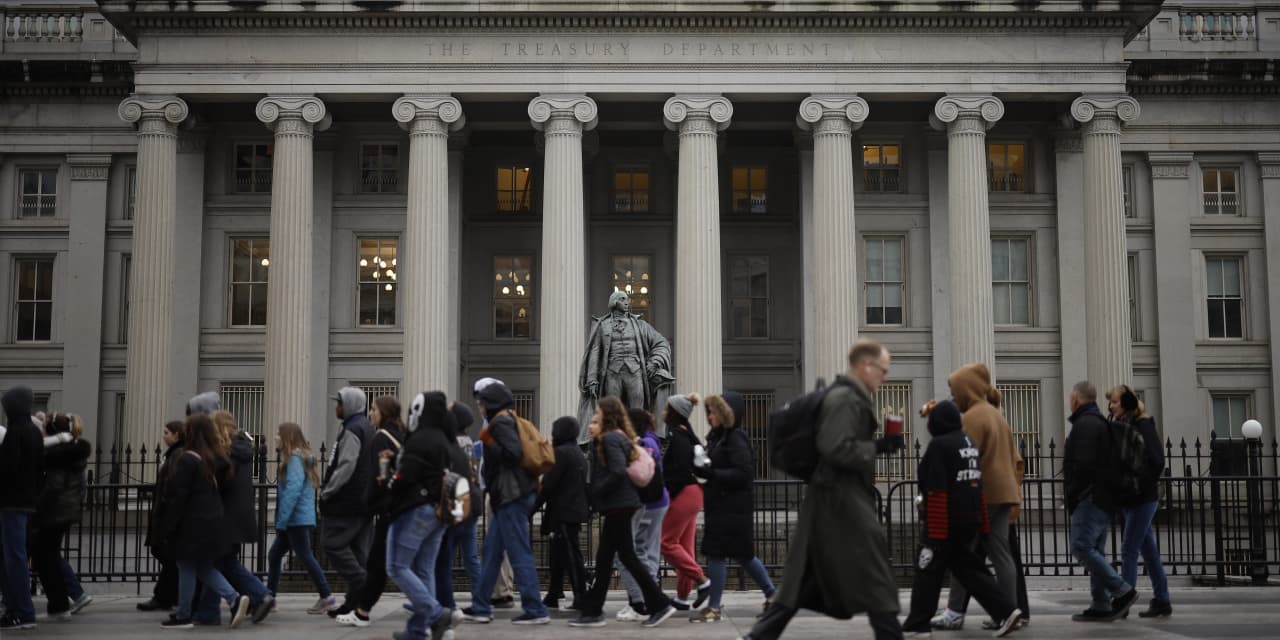Not long ago, the Treasury refunding announcements were treated like an afterthought by most except the biggest financial-market junkies.
Those days seem long gone. Now, they are moving stocks and bonds.
That was certainly the case on Wednesday, when the U.S. Treasury decided to moderate sales of its longer-dated debt, a move that helped push bond yields down significantly and provided support for stocks. Reduced yields prop up the value of bonds already in investors’ portfolios.
The department on Wednesday said it would sell $112 billion in long- and medium-term securities in its coming auctions. It increased the amount of bonds and notes on offer, but dialed back the increase in 10-year and 30-year auctions compared with the amount laid out in August. Sizes for both coupons were $1 billion lower than what had been announced in August.
In the past, Treasury refunding announcements would go unnoticed by markets but the larger than expected borrowing announcement in the third quarter changed things. It sent the 10-year and 30-year yields higher, forcing Americans to pay more for their mortgages, credit card balances, and bank loans
Yields have been rising since then, with those on the 10-year note and the 30-year bond hitting their highest level since 2007 in October, causing the value of bonds and notes to fall sharply. The
iShares 20+ Year Treasury Bond exchange-traded fund
(ticker: TLT) has fallen 14% so far this year.
Now, reduced supply on the long-end is causing the opposite. Yields fell Wednesday after Treasury officials cited the historic climb in yields, and the “term premium,” the extra compensation demanded to hold longer-dated bonds, as reasons for being less aggressive with issuance. Officials also noted possible “early evidence of waning demand” as demonstrated by the weak reception at the 30-year auction this month.
Fewer bonds available in the market suppresses yields because investors may compete to buy those bonds.
Treasury expects one more quarter of larger auctions, although “we suspect the risk is tilted toward a more measured approach going forward,” wrote Ben Jeffery, an interest rate strategist at BMO Capital Markets.
The Treasury has historically followed a principle of being “regular and predictable” and Wednesday’s move to replicate increases for most debt appears to be in line with its commitment to consistency.
With respect to Treasury bills, or debt maturing in under a year, the Treasury said it “expects to maintain bill auction sizes at current levels into late-November.”
The T-bill share of the market is already elevated—21% of the market compared to the recommended range of 15% to 20% set by the Treasury Borrowing Committee in November 2020. It’s expected to remain above the range at least until the end of January, said Joshua Frost, who is assistant secretary of the Treasury.
The yield on the 10-year Treasury, which hit a 16-year high of 4.987% on Oct. 19, closed at 4.790% on Wednesday. The 30-year bond fell to 4.974%, after closing at 5.024% on Tuesday.
The equity markets closed with gains: The
S&P 500
was up 1.1% and the tech-heavy
Nasdaq Composite
was up 1.6%.The
Dow Jones Industrial Average
gained 221 points, or 0.7%.
The reaction makes sense. In the past few months, stock prices and bond yields have typically moved in opposite directions. With news of lower-than-predicted supply on the long end, yields get suppressed while equities or risky assets charge ahead.
To be sure, the Federal Reserve’s decision to pause as well as Purchasing Managers Index, or PMI, coming in lower may have influenced the moves as well and there’s no way to quantify the precise impact of each announcement.
Let’s see if they last.
Write to Karishma Vanjani at [email protected].
Read the full article here


